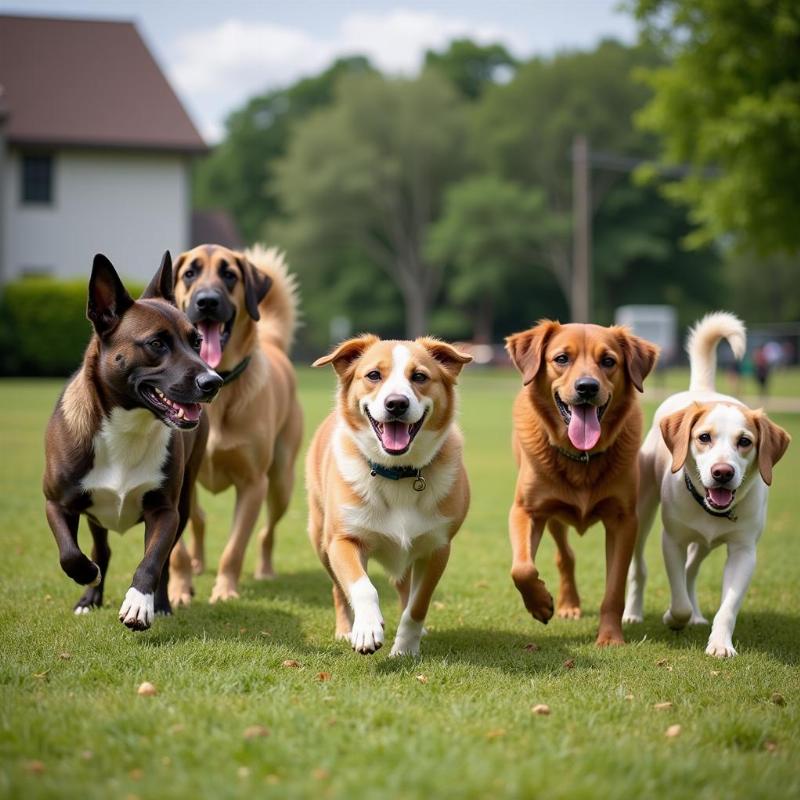Turning a crazy dog into a master manga character might sound like a fun, whimsical idea, but in the real world of dog ownership in the US, we’re talking about transforming a rambunctious, perhaps unruly canine companion into a well-behaved, happy member of the family. This requires understanding your dog’s breed-specific needs, consistent training, and a whole lot of patience. Forget the magic wand, we’re going to focus on proven techniques grounded in positive reinforcement and a deep understanding of canine behavior.
Understanding Your “Crazy” Dog
First, let’s ditch the label “crazy.” Every dog, even the most energetic and seemingly chaotic, has underlying reasons for their behavior. Is your dog a puppy bursting with energy? A herding breed instinctively nipping at heels? Or maybe a rescue dog with an unknown past and some anxiety? Identifying the root cause of your dog’s “craziness” is the first step towards effective training. Consider factors like breed, age, history, and environment. Consulting with a certified professional dog trainer or a veterinarian specializing in animal behavior can provide valuable insights tailored to your dog’s specific needs.
Mastering the Basics: Obedience Training for American Dogs
Obedience training is the foundation for a well-behaved dog, regardless of breed or age. Basic commands like sit, stay, come, and down are essential for safety and control, especially in the US where leash laws and public spaces require responsible pet ownership. Start with short, positive training sessions, using high-value rewards like treats or favorite toys. Consistency is key, and remember that patience and positive reinforcement are your best allies. Avoid punishment-based training, which can create fear and anxiety. Instead, focus on rewarding desired behaviors and redirecting unwanted ones.
Breed-Specific Training Needs in the US
Remember that breed-specific traits can significantly influence training approaches. A high-energy herding dog like a Border Collie will require more mental and physical stimulation than a low-key Basset Hound. Understanding your dog’s breed and its inherent tendencies will help you tailor your training methods for maximum effectiveness. The American Kennel Club (AKC) provides valuable resources on breed characteristics, which can inform your training strategies and help you choose appropriate activities.
Socialization: A Crucial Step for American Canines
Socialization is especially important in the US, where dogs frequently encounter other dogs and people in parks, dog-friendly businesses, and neighborhoods. Early and positive socialization experiences can help prevent behavioral issues like fear aggression or reactivity. Expose your dog to a variety of sights, sounds, and smells in a controlled and safe environment, starting from puppyhood.
 Dog Socialization in the US
Dog Socialization in the US
Turning “Crazy” into Calm: Addressing Specific Behavioral Issues
If your dog exhibits specific problem behaviors like excessive barking, destructive chewing, or separation anxiety, consult with a certified professional dog trainer or veterinary behaviorist. They can help you develop a tailored behavior modification plan based on your dog’s individual needs and your specific circumstances.
Conclusion: From Chaos to Canine Companion
Turning a “crazy” dog into a well-adjusted companion isn’t about suppressing their natural energy, but about channeling it positively. With patience, consistent training, and a deep understanding of your dog’s needs, you can transform your rambunctious pup into a “master” of good behavior, a happy and well-adjusted member of your family, perfectly integrated into the American dog-loving lifestyle. Remember, the journey from “crazy” to calm is a marathon, not a sprint. Embrace the process and celebrate the small victories along the way.
FAQ
- How do I find a certified dog trainer in the US? The Certification Council for Professional Dog Trainers (CCPDT) is a good place to start your search. You can also ask your veterinarian for recommendations.
- What are some common mistakes to avoid in dog training? Inconsistency, using punishment-based methods, and expecting overnight results are common pitfalls.
- How important is socialization for my dog? Socialization is crucial for preventing behavioral issues and helping your dog become a well-adjusted member of society.
- What should I do if my dog exhibits aggressive behavior? Consult with a certified professional dog trainer or veterinary behaviorist immediately.
- How can I find breed-specific information about my dog? The American Kennel Club (AKC) website is a great resource for breed-specific information.
- How long does it take to train a dog? The time it takes to train a dog varies depending on the dog, the training methods, and the desired level of obedience.
- Is it ever too late to train an older dog? It’s never too late to train a dog, although older dogs may learn at a slower pace than puppies.
Related Articles on Beautdogs.us
- how to get dog to stop barking at cat
- turning a crazy dog into a young master manga
- how to keep neighbors dogs from pooping in your yard
Beautdogs.us is your premier online destination for all things dog-related in the US. We offer expert advice on dog breeds, care, training, and products, catering to both novice and experienced dog owners. Whether you’re looking for breed-specific information, training tips, or product recommendations, Beautdogs.us is your trusted source for comprehensive and engaging dog care information. Contact us at [email protected] or +1 501-555-7529.